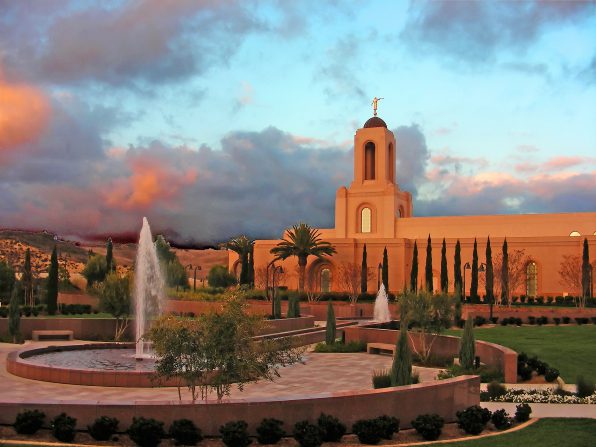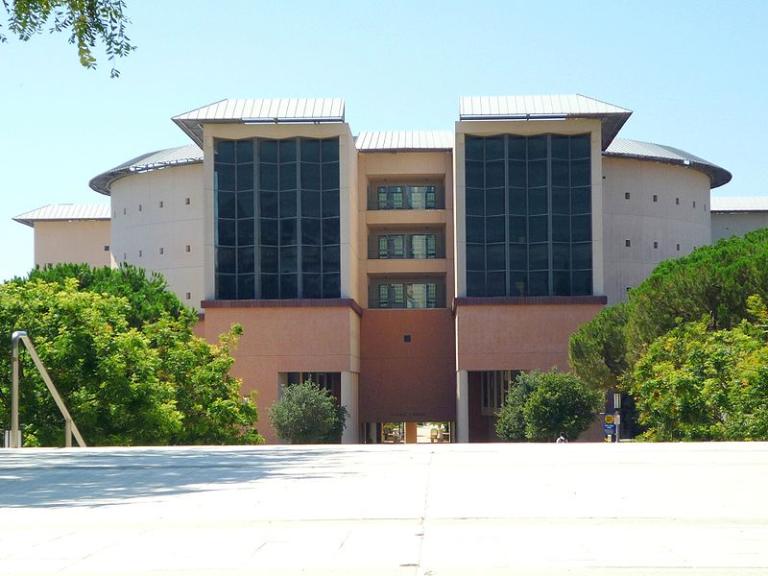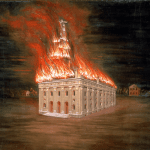
(LDS Media Library public domain photograph)
One of the things that I like most about the place that we stay when we’re here is that it’s only a few minutes away from the Newport Beach Temple. We attended a session there last night (with a friend, her daughter, and her son-in-law), and so this article caught my particular attention when I saw it this morning: “A Deeper Look into the Power of Latter-day Saint Temples: Why do others see Latter-day Saints as so good? Delve into the power of the law of the gospel and how this covenant shapes the lives of Church members and helps them become more like Jesus Christ.”
And there’s food for thought in this piece, as well: “America’s On Again, Off Again Relationship With God: We might not be headed for a godless future — yet.”
I also liked this short essay: “Caring for Creation Is a Biblical Calling”
And I’m more sympathetic to this point of view than, I think, some would imagine me to be: “Quantum physics reveals the unity of the universe: Reviving ancient philosophies”

I want, now, to share with you some thoughts from Roger Trigg, Does science undermine faith? (London: Society for the Promotion of Christian Knowledge, 1918). Roger Trigg is Emeritus Professor of Philosophy at the University of Warwick and Senior Research Fellow at the Ian Ramsey Centre of the University of Oxford, as well as a Fellow of the International Society for Science and Religion. Among other things, he is the author of Beyond Matter: Why Science Needs Metaphysics, which I own and which I’ve heavily marked up.
We must be wary of too readily accepting the long-established thesis of the intrinsic conflict between science and religion. It does not bear historical examination, in that, for instance, the founders of modern science in the seventeenth century were often motivated by a theistic understanding of the world. Scientists such as the great Isaac Newton, for example, rooted what they saw as ‘natural philosophy’ in a Book of Nature. They saw God as its Author, and the Book was considered to be as informative about God’s world as that other Book, the Bible. Newton declared that ‘the most elegant system of the sun, planets and comets, would not have arisen without the design and dominion of an intelligent and powerful being’. Reference to God was as essential to his natural philosophy as the working of his mathematics. Many of the first participants of the Royal Society, the prestigious scientific institution in London founded in 1660, at the time of the restoration of the monarchy, were strongly motivated in their scientific research by belief in God. The slogan of a group of thinkers called the Cambridge Platonists, who influenced Newton, was ‘reason is the candle of the Lord’. It was not regarded as a blinding searchlight, only a flickering and hesitant flame. Nevertheless, their trust in its illumination for the pursuit of human knowledge was grounded in religious faith. (12-13)
Is the principal focus of science different than that of religion? Trigg says that it is. Of course. But he doesn’t want to go too far in this, to the point that science is about The Real World while religion is purely subjective, making purely personal and subjective claims. To make that concession would deprive religious faith of any actual tether to intersubjective reality
Yet if nothing can count against what we believe, perhaps there is nothing that can count in its favour either. An empty faith that can never be challenged is also one that can never be supported. Faith that cannot be false cannot be true, because it does not seem to be about anything. (14-15)
Science doesn’t deal with meaning and purpose. It concentrates on how things happen, and has little or nothing to say on why they ultimately happen. Trigg grants this. But he does not grant the notion, popularized by the late Harvard paleontologist Stephen Jay Gould, that science and religion are totally distinct, that they constitute what Gould termed “non-overlapping magisteria.” Religion, Trigg says, must not be reduced to mere stories that are wholly unconnected with reality, or to trafficking merely in subjective values rather than in objective facts.
Do humans have intrinsic worth? Do they have inalienable rights? If so, science cannot demonstrate them. Are there things or actions that are intrinsically good, or intrinsically evil? If so, science can’t really talk about them in such terms.
Trigg also takes aim at sloppy thinking about the naturalistic, evolutionary origins of human thought, hinting at the idea that, if we see rationality as a coping mechanism that developed in order to aid us in surviving and in transmitting our genes through reproduction, we are sawing off the branch on which we ourselves sit with our purportedly rational ideas:
Yet scientists, too, have use their rational abilities to assess evolutionary theory and its scope. The claims of the theory presuppose a human ability to use reason to recognize what is true. If humans have just evolved to believe in the theory of evolution, there could be no reason to trust it. We may accidentally have hit on the truth or we may not. We would not be in any position to assess our position rationally. If the theory were true, according to its own lights it. would just be its usefulness in helping us to survive and reproduce that makes us believe it.
The very persuasiveness of modern science depends on a view of human reason that has to go beyond science itself. . . . Science . . . cannot exist in its own bubble, but needs presuppositions that have to be grounded elsewhere. The most central of these is a trust in human reason that is not conditioned by circumstance, physiology or whatever. (21)
He is fairly clear about where his own sympathies lie on the question:
The idea that ‘reason is the candle of the Lord’ is a powerful stimulus for respecting and trusting in science. (22)
Posted from Newport Beach, California













